Green tea is delicious and full of antioxidants, but heavy metal contamination from many tea brands is becoming a major concern. Here are our top picks for lead free green tea, plus the results of our green tea taste tests.
Table of Contents
About half of the coal burned in the world is burned in China, and Chinese coal is about 1,000 times higher in lead than American coal. Why does this matter in a discussion about green tea? Because most of the green tea sold worldwide comes from China and research strongly suggests that in terms of lead, it’s where it’s grown that is most important.
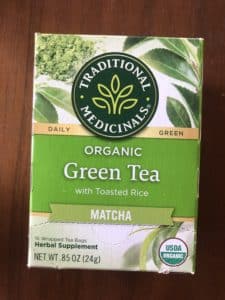
Our top pick for organic teas
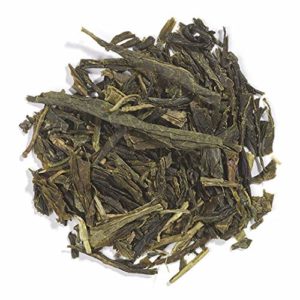
Runner up for lead free tea
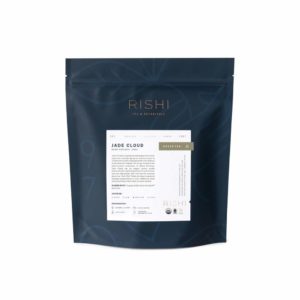
Third pick
Does Green Tea Contain Lead?
In a 2006 study looking at more than 1200 samples of tea, nearly a quarter of the green tea samples exceeded safety levels for lead. In a 2013 study, this time looking at 30 common teas (green, white, black, and oolong), 73% and 83% of teas brewed for 3 minutes and 15 minutes respectively contained levels of lead considered unsafe in pregnancy or while nursing an infant. Shockingly, the organic green teas contained significantly higher levels of lead compared to standard green tea when brewed for 15 minutes.
Happily, many in the tea industry have recognized the problem of heavy metal contamination and are taking steps to ensure safety. Some companies undertake their own stringent testing and third-party testing to ensure tea is lead-free.
After all, if you’re drinking green tea for its health benefits, you don’t want to be worrying that it might actually harm your health or, if you’re pregnant, the health of your fetus. Indeed, the extremely low levels of lead allowable under California’s Proposition 65 regulation are based on research showing accumulation in brain tissue and subsequent cognitive impairment in offspring.
The best organic green teas: our top picks
Here are my top picks for the best organic and lead-free green teas. Curious about how we rate products? Click here to view our methodology, which at its core, is about voting with our dollars to fight climate change.

Traditional Medicinals Tea
Highlights: The best of the best! A longstanding B Corp providing almost 100% certified organic teas with Fair Trade certifications and eco-friendly company policies and 100% renewable energy use.
USDA Organic and California Certified Organic Farmers (CCOF) certified, Traditional Medicinals teas are arguably the most sustainable, eco-friendly, socially responsible tea company around. So much so that 100% of the electricity used by Traditional Medicinals comes from renewable resources and even their company cars are EPA SmartWay® Certified.
As a B Corporation since 2010 and part of the Green America’s Green Business Network™ since 1992, Traditional Medicinals is used to being highly transparent about sustainability efforts. Happily for me, the company offers masses of information in their Traditional Medicinals Sustainability & Benefit Corporation Annual Report which they began publishing in 2012.
The company has been committed to sustainable agriculture for more than 45 years, with Traditional Medicinals starting out by sourcing organic herbs from Trout Lake Farm in the 1970s. This was America’s first major organic medicinal plant farm, and Traditional Medicinals still buy herbs from the farm.
Traditional Medicinals became a member of CCOF way back in 1995 and in the mid-2000s managed to transitional almost all of their wild-collected botanical ingredients to USDA Organic certification under the ‘Wild-crop Harvesting Practice Standard.’ At the most recent count, 99.6% of the company’s herb purchases were certified organic.
All of the herbal teas are non-GMO Project Verified, as are the tea bags and strings. And, going beyond most tea companies, Traditional Medicinals have been committed to fair trade since 1998, when the first of their products was certified by Fair Trade USA (then Fairtrade International, or FLO). In 2017, the company increased the amount of botanicals sourced with Fair Trade certification by 23% (by weight).
Traditional Medicinals is also committed to social enterprises, including building five schools in India, now serving 850 students. The company has also given 570 bicycle scholarships to students in India to provide transportation to school, and has installed 548 water catchment and storage devices to help provide water security for 3,300 people in Rajasthan, India. All in all, this amounts to $1.1 million in contributions made to domestic and international non-profit organizations between 2014 and 2017.
Oh, and they test all their products, including all herbal ingredients, to ensure there are no heavy metal or microbial contaminants. I reached out to the company to find out more about their testing procedures and they let me know that every batch of incoming herbs is tested for contaminants, including heavy metals like lead. The company has adopted the strict European Pharmacopoeia standards for elemental impurities, and their processes comply with those set out in the United States Pharmacopoeia 233.
The company also let me know that they use Darjeeling green tea, grown in India on the tea estate of Ambootja in the Darjeeling District. The farms on this estate run on biodynamic and organic practices that help prevent soil erosion, enhance soil fertility, and use only natural fertilizers to ensure the safety of the tea, the farmworkers and the environment.
Traditional Medicinals have managed to divert 86% of waste from landfills and are striving for a 90% diversion rate to achieve Zero Waste Certification. The company has been awarded ‘Best Place to Work’ three years in a row by the North Bay Business Journal, were a B Corp ‘Best for the World’ honoree, and were recently honored by the World Wildlife Fund for Nature China for helping to establish the world’s first panda-friendly certification (which advocates for and protects the giant panda bear in southern China, where the company sources wild southern schisandra berries).
They even use hydroelectricity to power many farm processes and the workers are provided housing, cooking fuel, footwear, protective clothing, winter blankets and basic medical treatment free of cost. There’s an Infant Nutrition Program that distributes food to young families, free primary education and scholarships set up for children, and social security in the form of pensions and support for dependents. More information on all of Traditional Medicinals corporate social responsibility and sustainability efforts can be found in their 2019 report.
We taste tested the Traditional Medicinals Green Tea Matcha blend, and plan to include the product as a staple. The Genmaicha and matcha blend is full bodied, with the genmaicha predominant in the flavor profile.
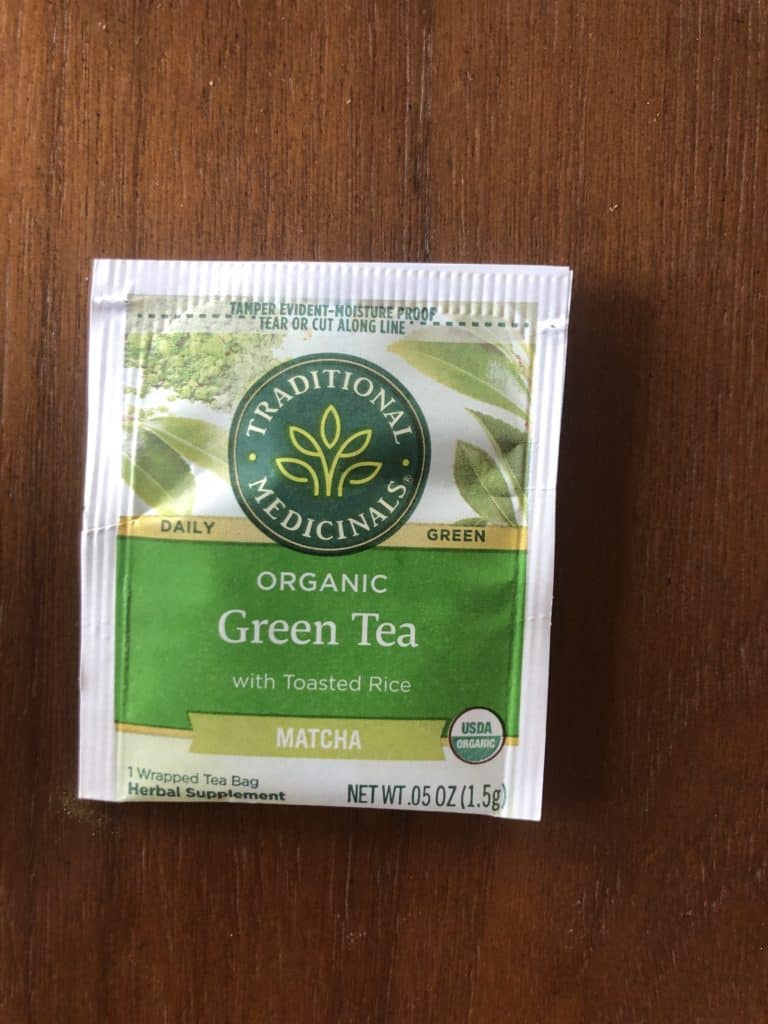
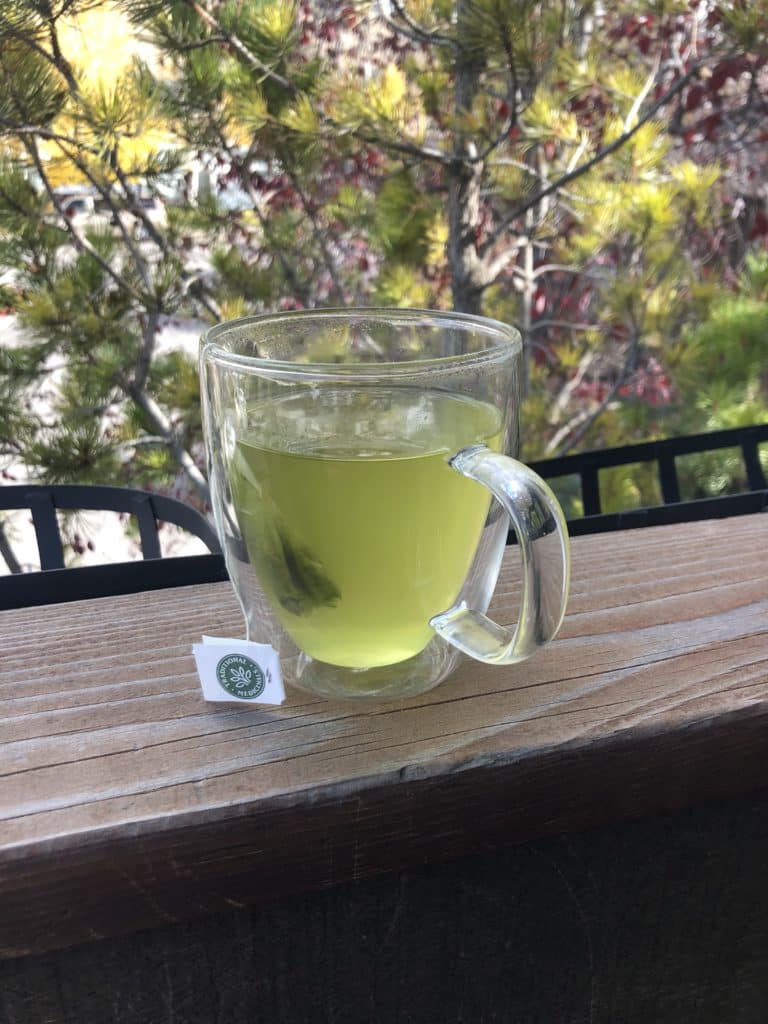

Frontier Co-Op Tea
Highlights: Long established sustainable and Fair Trade co-op with a wide range of green tea from China, India, and Japan.
Frontier Co-Op Tea has a Well Earth sustainable sourcing program built on 30 years of experience buying botanicals. This program involves direct trade with farmers to promote fairer compensation and greater social responsibility, as well as greater sustainability for tea gardens.
The company is particularly committed to biodiversity initiatives and land restoration. In 1992, for instance, staff at the Co-Op volunteered to plant 21 acres of tallgrass prairie at their Norway, Iowa, headquarters, which later became part of the United Plant Savers Botanical Sanctuary Network.
Frontier Co-Op Tea buys certified organic ingredients wherever possible, buying direct from responsible, sustainable sources. They also undertake extensive testing, including microbiological testing and tests for heavy metals such as lead, all in their in-house laboratory. Our product standard covers post-harvest treatment and processing. They do not purchase any herbs or spices that have been treated with irradiation or chemicals such as ethylene oxide.
The company got its start as a two-person operation in 1976 in a river cabin in Eastern Iowa. Nowadays, Frontier Co-Op is a major supplier to the natural products industry, selling teas, spices, essential oils and more.
Frontier Co-Op began offering Fair Trade Certified teas in the 2000s and introduced the first Fair Trade Certified spices to the US then too. They’ve long published a Sustainability Report, helping improve transparency and accountability, and they have even established a Simply Organic Scholarship at the University of California Santa Cruz Center for Agroecology and Sustainable Food Systems. The Co-Op has built schools and wells and other infrastructure in Madagascar and Vietnam and has donated more than a million dollars over the years to various socially responsible projects.
Frontier Co-Op is a member (often a founding member) of:
- The Organic Trade Association (OTA)
- Iowa Sustainable Business Forum
- Sustainable Packaging Coalition
- GreenBlue, and the Natural
- Organic Health & Beauty Alliance (NOHBA)
Frontier Co-Op offers a wide range of green teas, including Organic Bancha Leaf Green Tea, fruit-flavored green tea, matcha green tea, Sencha green tea, kukicha twig roasted green tea, Gunpowder and Genmaicha green tea, chai green tea, Young Hyson Green Tea, and Earl Grey green tea, as well as some decaffeinated options. Their sources include India, China, and Japan.

Rishi Tea
Highlights: Long-established Direct Trade tea company using compostable and recyclable packaging for their mostly certified organic teas.
Rishi Tea has been around since 1997, earned USDA Organic certification in 2002, and is a Direct Trade importer of organic teas and botanicals. This means that they cultivate and maintain long-term relationships with growers to help encourage ecologically sustainable gardens with fair compensation for those partners.
Around 95% of Rishi Tea’s products are now certified organic and the company offers both loose leaf tea and tea in sachets. They introduced the sachets in 2013 after a long search for an environmentally friendly tea bag that was compostable, BPA-free, and perfect for tea infusions.
Because the company is engaged in Direct Trade, they can trace all tea back to where it’s grown, and they work with farmers to promote organic agriculture and biodiversity. When the company moved in 2014, Rishi made sure that the new headquarters incorporated LED lighting, motion-controlled to minimize energy use, energy-efficient appliances, reclaimed materials, and other sustainable building techniques. Rishi has a composting culture, so any excess products are used to feed trees and plants in the community.
Rishi tea bags are made from a plant-based material called polylactic acid (PLA), which is inert and allergen-free. PLA is not derived from petroleum, so doesn’t pose a risk of microplastics leaching into tea or water supplies. The PLA tea bags are biodegradable in high heat, commercial quality composting systems (not home composting). They do not use glues, staples, or metals, just a cotton string, and printed paper tag, and are heat-sealed.
Rishi do not use any artificial flavors in their teas. They test all tea sourced from Japan for radiation, using an independent, third-party laboratory in the US, and they detail their latest test results online. They do not explicitly mention any testing for lead or other heavy metals, although their general company ethos strongly suggests they would have stringent quality control for all teas. I’ve reached out for comment and will update this review then.
Rishi Organic Green Tea Jade Cloud is both USDA Organic and Fair Trade, as well as GMO-free and is available in sachets. They also offer various types of matcha green tea and jasmine green tea, as well as Yuzu peach green tea, genmaicha matcha, and others.
We tested Rishi’s Sencha tea. The company seems to have undergone a re-brand, which we love, but more packaging came with the changes. The Rishi sencha tea bags were wrapped individually in packaging that likely isn’t recyclable, however, the actual tea was among the best we taste tested.
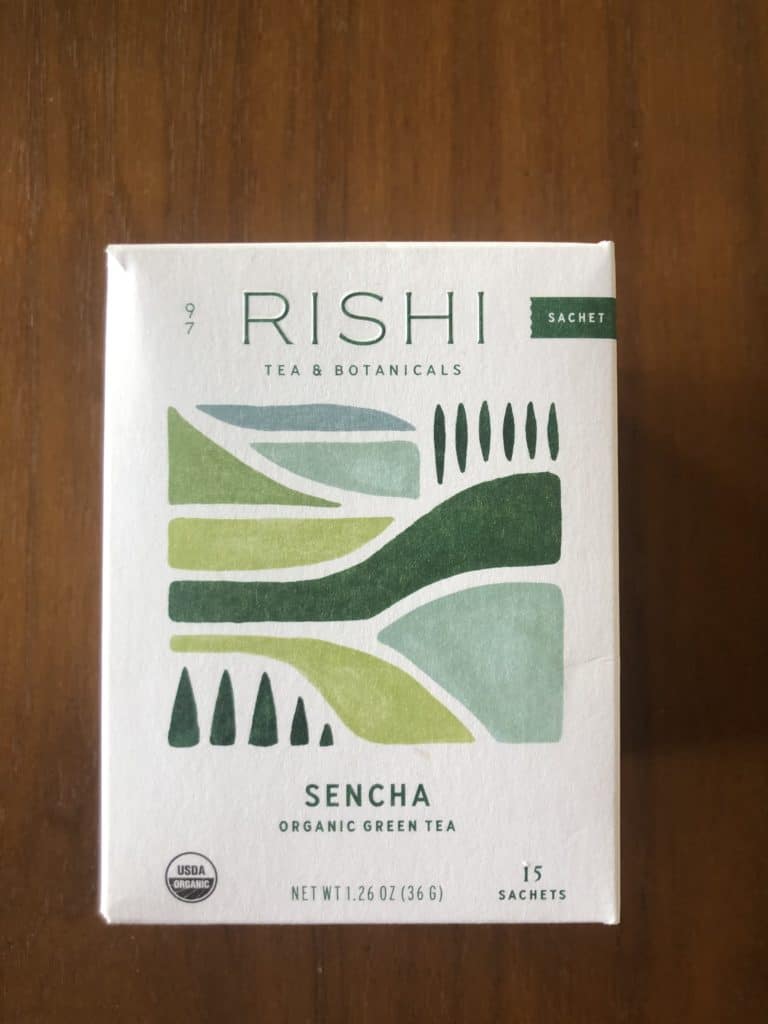
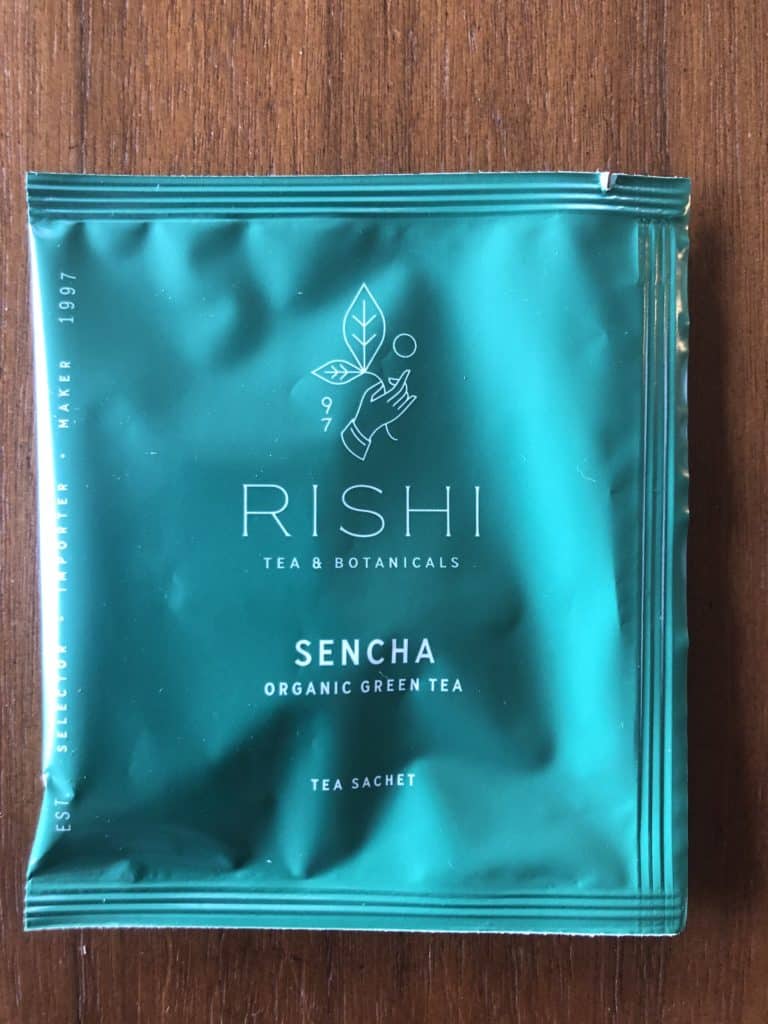
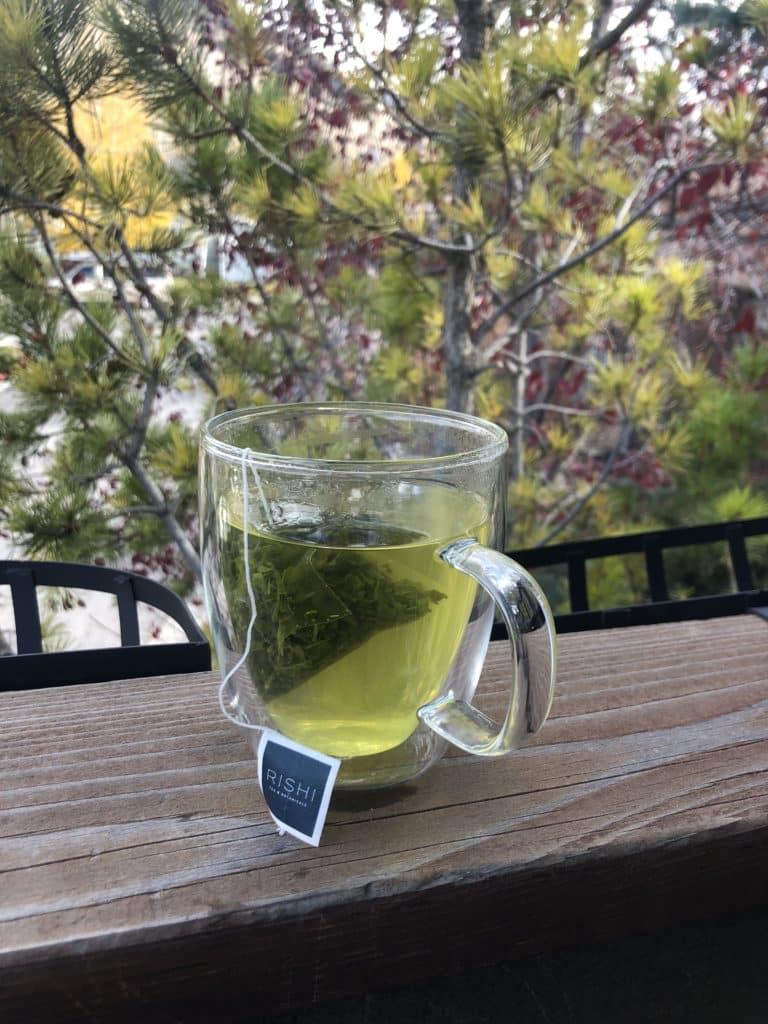
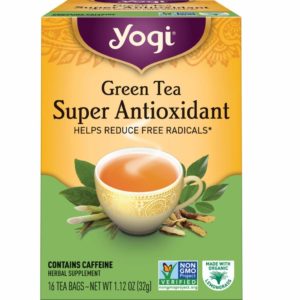
Yogi Tea
Highlights: Mostly certified organic, non-GMO Project verified, and available in plastic-free tea bags and recycled, recyclable, and eco-friendly packaging from a well regarded B Corporation.
Yogi Tea offers a wide range of green tea blends as well as straight-up organic green tea. Their teas are USDA Certified Organic and non-GMO Project Verified for the most part, with others non-GMO and made with organic ingredients but not yet certified. Yogi Teas contain no artificial flavorings, sweeteners, colorants, or such, and are not irradiated.
Yogi Tea’s tea bags are made with manila hemp fibers and wood pulp, meaning they’re plastic-free, and the filtration paper is bleached only with oxygen. Packaging is heat-sealed, meaning no glues, and all packaging is printed with environmentally friendly vegetable-based inks, with tea cartons made from 100% recycled paperboard and case boxes made from 60% recycled materials. Everything is compostable, except for the staple used to seal the bag and attach the tag (on some teas).
Yogi Tea has been a B Corporation since 2014 or, that is, its parent company East West Tea (which also owns Choice Organic Teas) has been. East West Tea was an honoree for Best for Overall 2019, and Best for Changemaker 2019, 2018, and 2017. With a B Corp score of 105.6 (and a high of 125 in 2016!). The company is based in Oregon and is a LEED-certified tea production facility.
Several Yogi Teas are Rainforest Alliance Certified, while all Yogi Teas are non-GMO, with many already certified by the Non-GMO Project. The company tests all raw ingredients using microbiology testing and identity confirmation, so you know that what’s in your tea is what’s supposed to be in your tea. The company also asks suppliers to adhere to National Organics Program standards, meaning that there are no GMO ingredients, artificial ingredients, or ingredients contaminated by ionizing radiation or sewer sludge. They do not explicitly mention testing for heavy metals, so I have reached out for comment.
The Yogi Tea facility is Organically Certified by Quality Assurance International (QAI), an independent third-party organic certifier that verifies the organic integrity of all ingredients at every step of the production chain.
We tested Yogi tea green tea, and it was one of our least favorite from a taste perspective because Yogi tea sneaks in several roots to its “green tea” formula. As green tea purists, we prefer a plain green tea.
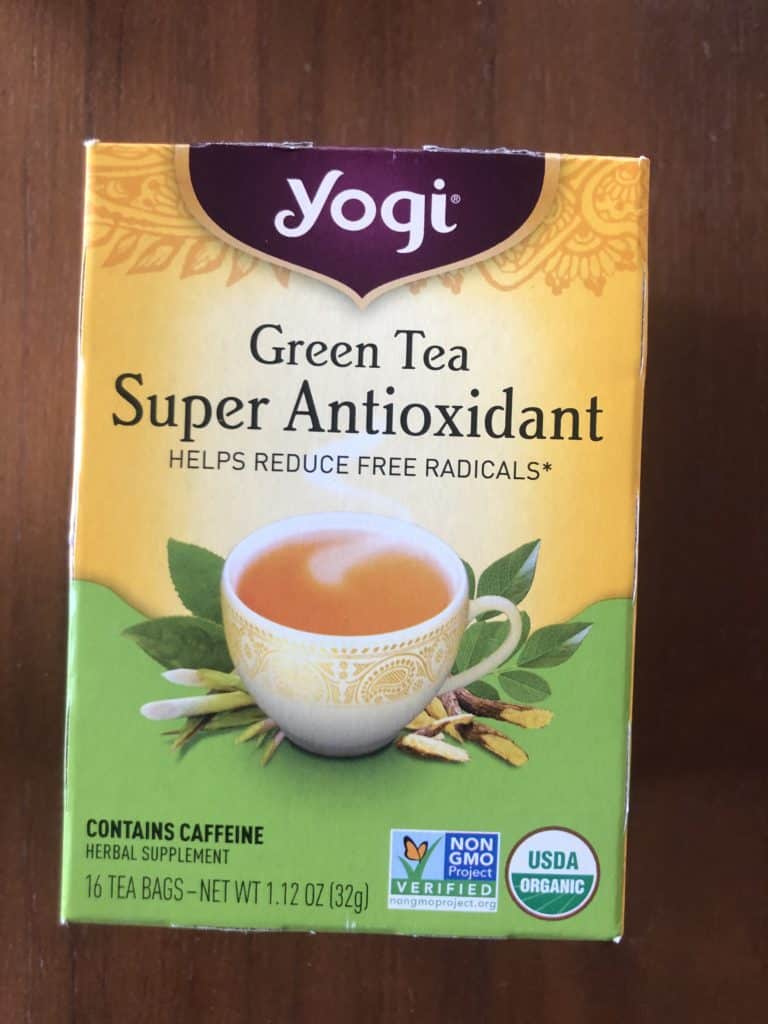
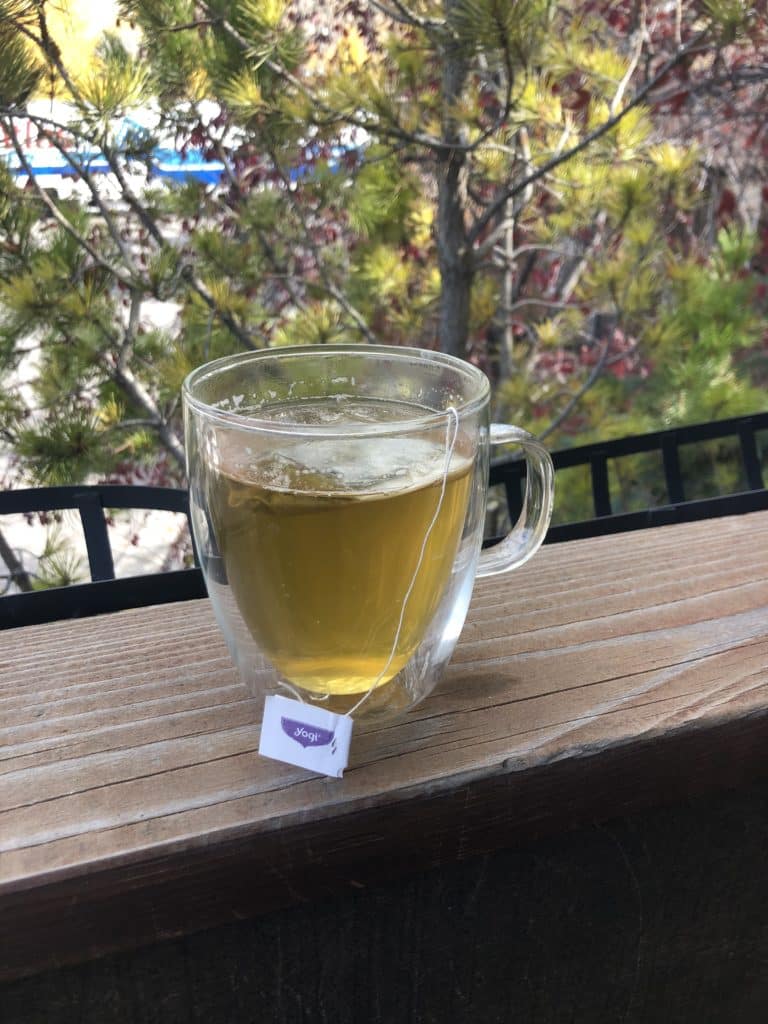
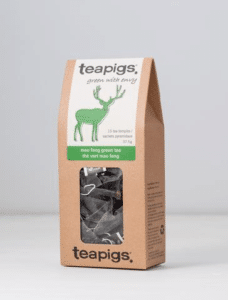
TeaPigs
Highlights: Mostly organic, mostly eco-friendly providers of specialized green tea, matcha, and other teas.
TeaPigs were the first tea company to earn the Plastic-Free Tuskmark from A Plastic Planet, which certifies some of their packaging as free from conventional plastic derived from fossil fuels, at least for their 15s, 50s, tins of tea, and matcha tins. Their loose-leaf tea pouches, matcha sachets, and sample envelopes are made with paper and polyethylene, however, making them hard to recycle. The company is switching this packaging to a compostable material made with wood pulp.
The TeaPigs tea temples are made with cornstarch, paper, vegetable-based inks, and are sealed with heat, making them fully biodegradable (best in a municipal compost rather than at home).
Not all Teapigs tea is organic, but the company does claim to test 100% of the tea for pesticides. Some of the tea (but not the green tea) has Rainforest Alliance certification and they’re working to extend the certification across their teas. They also installed solar panels on the roof of their tea tasting room to help generate electricity.
TeaPigs are members of the Ethical Tea Partnership (ETP), a non-profit that works to improve tea sustainability and the lives and livelihoods of tea growers and processors. They’re also an approved supplier of the Sustainable Restaurant Association and a Living Wage Employer.
As well as offering matcha green tea powder, TeaPigs also offer Mao Feng Green Tea.
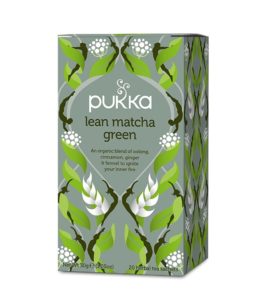
Pukka Herbs Tea
Highlights: Carbon neutral B Corporation with a whole host of certifications and socially responsible policies and initiatives, but their tea bags and packaging may still contain some undesirable components.
Pukka Tea are on a mission to benefit people, plants, and the planet, with Fair for Life certification for all teas, Soil Association organic certification for most, and Fair Wild certification for 89% of the wild-sourced herbs they use. They’ve been around since 2001, a B Corporation since 2016, and are certified For Life, meaning they have a robust approach to corporate social responsibility.
Pukka publicly committed to becoming carbon neutral by 2030 and to this end, mapped their entire carbon footprint in 2017 from ‘crop to cup’, allowing them to figure out science-based carbon reduction targets. Way ahead of their original plan, the company became carbon neutral in 2019, thanks in part to using 100% renewable energy at their head office.
They donate 1% of revenue to environmental and social causes through 1% for the Planet. In 2018, Pukka Herbs bought 16% more organic herbs than in 2017 as part of their regenerative organic agriculture strategy. They offer a wealth of information in their most recent Sustainability Report.
Pukka use recyclable tea boxes made from FSC certified card, printed with vegetable-based inks. They also use tea envelopes that can be recycled in paper recycling bins, but these are not totally free from plastic, unfortunately. Their tea bags also leave a bit to be desired, as they are made with 99% plant materials but are treated with a resin (they don’t state that this is epichlorohydrin, but it seems likely). The tea bags are staple-free and stitched together with organic cotton, however, which is good to see. And the tea bag tags are made with FSC card. The tea bags, string, and herbs themselves can all be composted, but the tag should be put in the paper recycling bin.
Pukka has consistently been regarded as one of the best places to work in the UK, with high employee satisfaction. Interestingly, the company launched a new Inclusion & Diversity policy in 2019, and everyone working at Pukka took part in training on understanding unconscious bias during 2019.
Where to Buy Green Tea, and Considerations Other Than Lead
Many of the best green tea options now come courtesy of Japan, where the export of green tea has increased dramatically in recent years. The same goes for Sri Lanka, with the 2013 study above finding the lowest levels of lead in both organic and standard green tea from Sri Lanka. Buying from Sri Lanka or Japan may also help you save money, given the significant price hikes seen with green tea from China after the Trump administration put tariffs on Chinese tea imports in 2019.
Now, some of you might be wondering if the earthquake and subsequent Fukushima nuclear power plant disaster could make Japanese green tea a bad choice too. Again, it’s a fair question, but the evidence suggests little to no chance that the country’s tea-growing regions would have been affected by radiation. In addition, the US Food and Drug Administration (as well as Japanese authorities and third-party testers) have put in place significant checks to ensure tea and other products are not contaminated with radiation.
One other consideration before I jump into my top picks for organic and lead-free tea… microplastics. That’s right, many green tea bags release plastic particles into brewed tea. One recent study found that “steeping a single plastic teabag at brewing temperature (95 °C) releases approximately 11.6 billion microplastics and 3.1 billion nanoplastics into a single cup of the beverage.” Not only could these microplastics affect your health, they can also enter wastewater streams and affect aquatic life and bird life.
The best way to avoid microplastics in tea is to use loose leaf tea. If you’re a fan of tea bags, though, avoid any that have fancy shapes (such as pyramids) as these tend to be made of nylon of polyethylene plastic. Even some tea bags made with natural fibers are sealed with plastic. So, ask questions and demand answers from companies about their production methods. You might also want to ask about epichlorohydrin, an epoxide resin sometimes added to tea bags to make them stronger. This is a known human carcinogen, although deemed food safe in the US.
There are also organic cotton reusable tea bags (View Price on Amazon) that you might want to consider, which are both non-toxic and eco-friendly.
Finally, after you’ve gone to great efforts to source organic, lead-free green tea that is not contained in plastic tea bags glued with a potential carcinogen, it’s best not to brew your tea in an unsafe pot. As I’ve talked about before on the site, cookware imported to the USA has to undergo certain kinds of testing to ensure that it doesn’t contain harmful levels of toxic heavy metals, but pottery you buy while on vacation and bring home yourself isn’t subject to such testing. If you’re buying a ceremonial teapot or cups from overseas, then, be sure it is certified to cookware or food safe standards, or use it for decorative purposes only.
interesting article Leigh, thank you!
Susan JunFish, MPH
Environmental Health consultant
Not Numi?
Leigh,
Thank you for this concise article. I will make sure I purchase my tea via links on your website.
I will also distribute the link to your website to my friends and family.
I would appreciate confirmation on one point of concern though. May I assume that neither you or your organization receive compensation from any of the companies listed?
Thank you.
Frank, stepping in for Leigh here. LeafScore is reader supported, this means that some of the links contained in articles like this are affiliate links. The site sometimes earns commissions from sales and we use the proceeds for further research. 10% of profits are donated to planting trees through American Forests: You can view the affiliate policy here: https://www.leafscore.com/affiliate-disclosure/
Leigh,
I understand the risks of lead contamination from tea grown in China. However, here in Charleston, SC we have the only tea plantation in the US. Is there any comparative data on the lead content of the Charleston tea?
Thanks
Hi Lloyd,
This is a great question!
Unfortunately, after some digging, I haven’t found any data on lead testing in Charleston tea. The main company growing tea there doesn’t mention lead at all, so I’ve reached out to them with questions and will update here if/when they respond.
However, it seems that SC has pretty poor air quality in general, including contamination from industrial pollution and energy production, which could mean lead in dust and soil on which plants are grown.
Additionally, a 2018 report found that 160 waterways in the area had concerning levels of lead.
So, all in all, I’d consider choosing an independently tested tea even if, sadly, it’s not local. While pushing for greater transparency of local tea providers, of course!
Thanks,
Leigh
Thank you so much for writing this very informative article. I will be interested to see an update when you receive feedback from the companies you have reached out to for comment regarding testing for heavy metals.
Thank You for the information, it’s very helpful! I wonder if any of these teas are certified glyphosate free also? I’ve been reading a lot about organic products having glyphosate, and that some organic products have tested as having higher glyphosates than non-organic. Same with organic cotton (I mention this since the article mentions organic cotton used in tea bags.) I will check the detox project website, as they are listing products that are now certified glyphosate free.
Thank you for this very informative, obviously well-researched article! I don’t understand why more emphasis is not placed on lead. Organic, sure, organic all over the place, but you really got to consider air pollutants on tea leaves, considering the majority of teas come from highly industrialized, polluted areas.
Hello,
I note that your organization tested and cleared teas for led, but are they also free of aluminum and cadmium?
Thanks